9 Best Dropshipping Websites To Start Or Grow Your Business
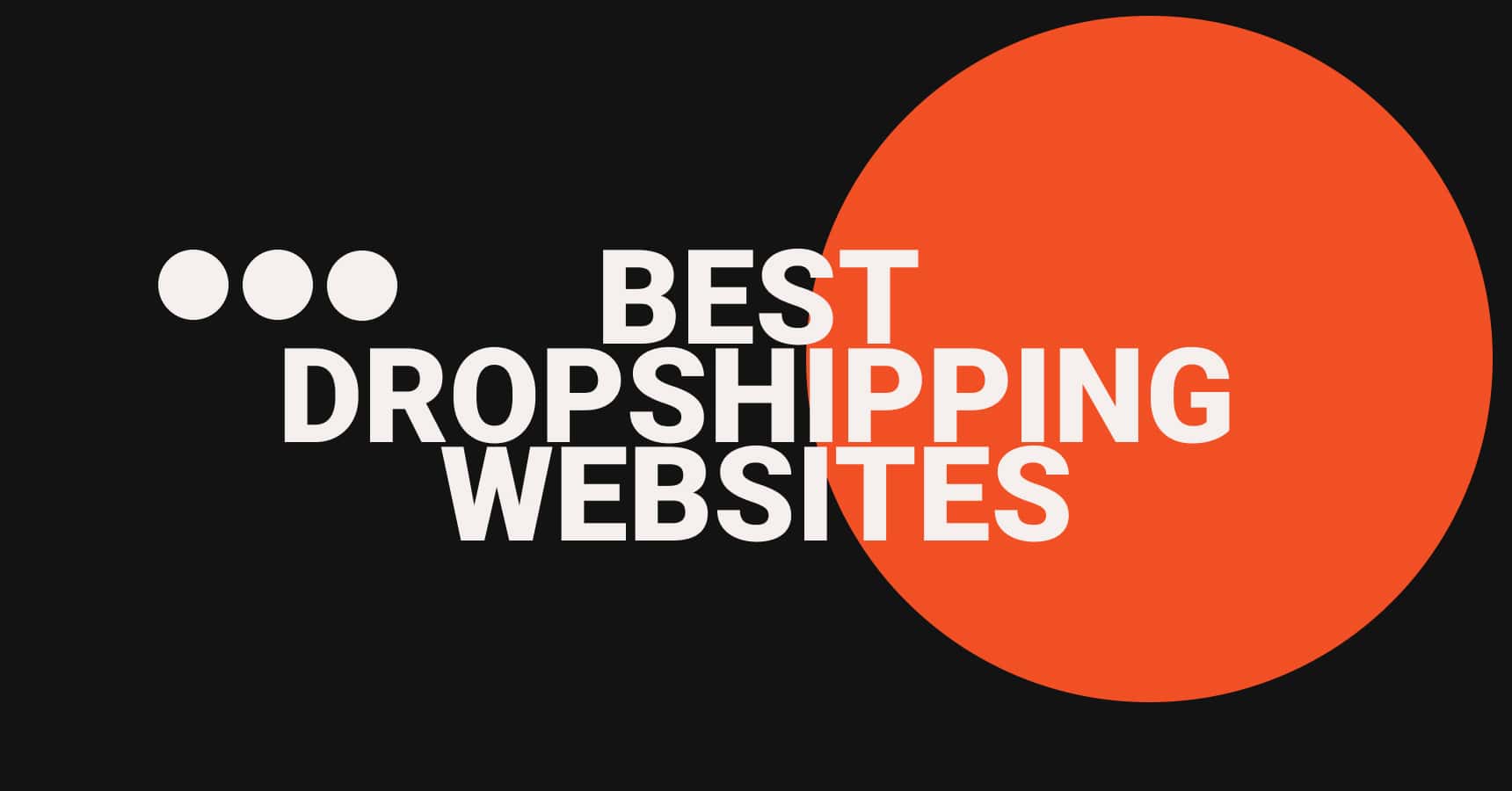
If you’re thinking about launching an online store this year, finding the best dropshipping websites is a smart move. These platforms can either make things super easy or turn your store into a time-consuming mess. That’s why choosing the right one can be a total game-changer 🧠
In this article, we’ll walk you through how dropshipping platforms work, what features to look for, and which sites are leading the pack. No fluff – just honest insights to help you grow your store with confidence.

What dropshipping sites are and how they work
So, what exactly is a dropshipping website? It’s basically a tool or service that connects you with suppliers who store, pack, and ship products directly to your customers. Instead of buying a bunch of inventory upfront, you only order items when someone makes a purchase in your store.
Here’s a quick rundown of the process:
- You create an online store and list products from a supplier.
- A customer buys something from your site.
- The supplier gets the order, ships the product to your customer.
Simple, right? You don’t need to handle boxes, labels, or warehousing. That’s why so many people love this model, especially when starting out.
How to pick the website for your store
Choosing the right dropshipping platform isn’t just about picking a name you’ve heard before. It depends on your goals, what you plan to sell, and who your customers are. For example, if you’re selling to US shoppers, fast delivery is key. But if you’re offering niche products globally, a bigger supplier pool might matter more.
Here are a few things to think about:
- Your product niche and how it matches the platform’s catalog
- Delivery times (especially if speed is part of your selling point)
- Platform compatibility with WooCommerce, Shopify, or other builders
- Fees, subscription plans, and hidden charges
- Reviews on supplier reliability, customer service, and return handling
- Bonus features like order tracking or automatic fulfillment
Keep in mind – what works for one seller might not work for another. Always try to match the platform with your business goals.
Best Dropshipping Platforms at a Glance: Pricing & Ideal Use
Not sure which platform to pick? This quick comparison table helps you find the best dropshipping website based on what it’s best for and how much it costs to get started:
Use this table to match your business goals with the right platform – whether you’re just starting out or scaling fast, there’s a tool here built for your needs.
9 best dropshipping websites worth trying
Let’s take a closer look at the top-performing dropshipping sites this year. These platforms offer a solid mix of usability, shipping options, supplier quality, and tools that can save you a ton of time.
AliDropship – full control and full service for your dropshipping journey
⭐4.8 on Trustpilot
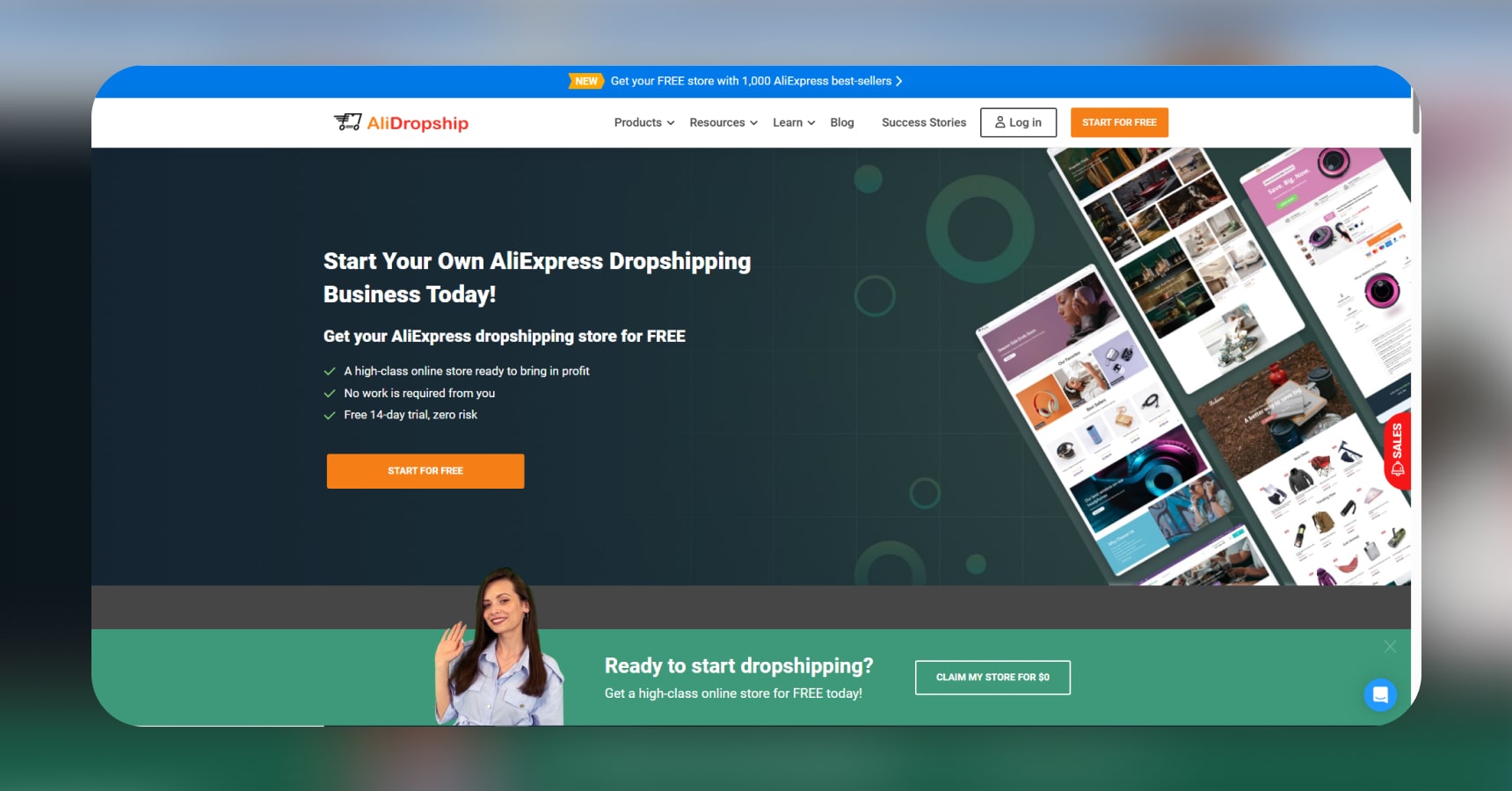
AliDropship is one of the best websites for dropshipping because it offers you complete ownership of a turnkey store along with a powerful, full-service platform to build and grow your business your way. With AliDropship, you get access to a large catalog of high-quality products from multiple suppliers, including original branded items and niche products. Everything is pre-optimized for easy import and selling, saving you a ton of time.
Key features:
- A free turnkey store
- Full ownership and customization of your online store
- Access to a wide range of products, including original brands and trending niches
- Smart automation for pricing updates, inventory management, and marketing campaigns
- Built-in social media promotion and email marketing tools
- Detailed analytics to help you track sales and improve performance
- Expert support and custom development services when you need them
💵 Pricing: Free 14-day trial, then $39/month
❌ Cons: Limited flexibility for those who want to change platforms later
🎯 Best for: Entrepreneurs who want full control and ownership of their store, with built-in automation tools for easier growth.
Sellvia – the all-in-one dropshipping ecosystem built for sellers
⭐️4.7 on G2
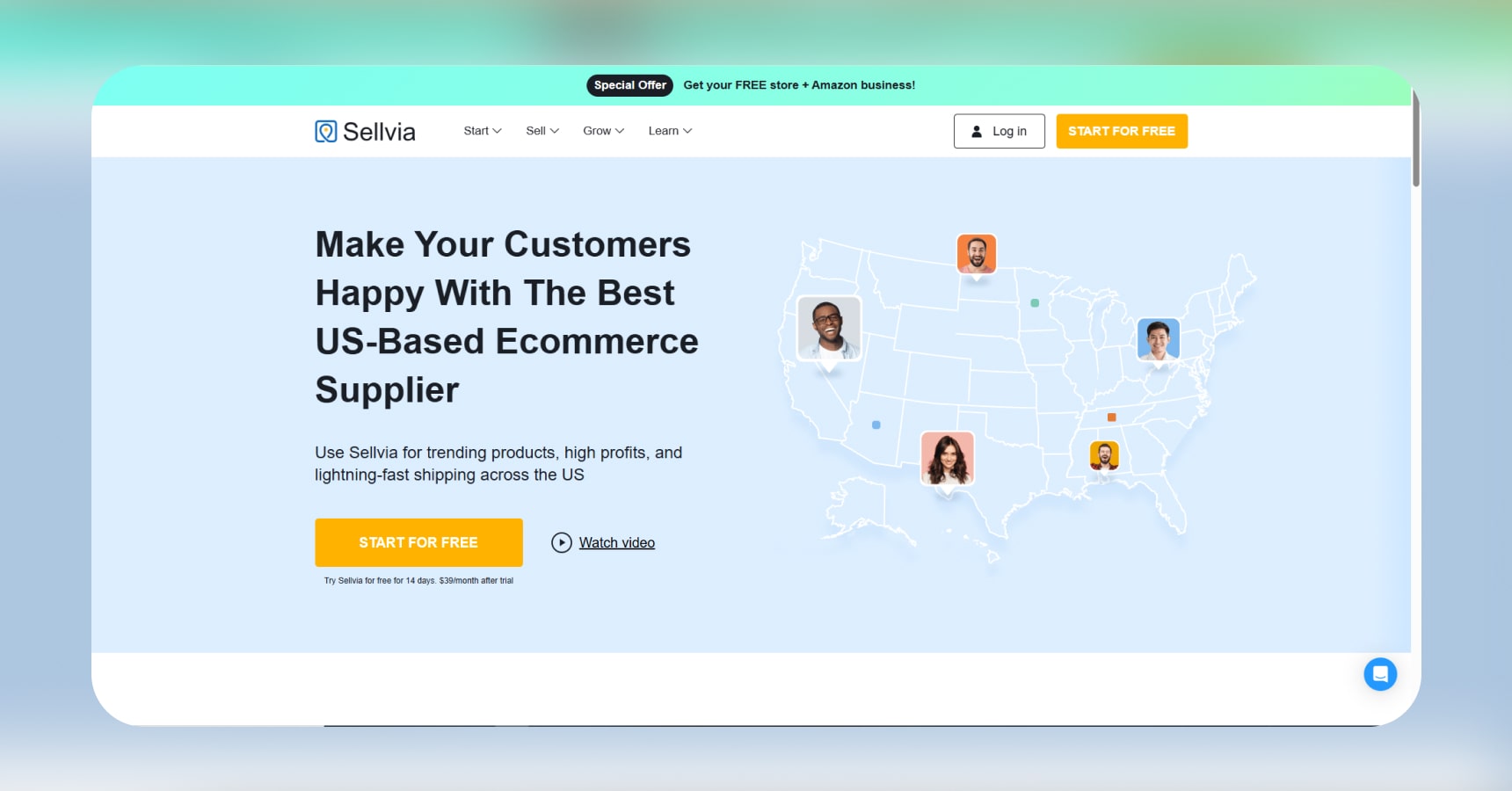
Sellvia is another top choice among the best dropshipping websites examples, especially if you want a smooth, all-in-one solution to start and grow your business. It gives you access to a huge catalog of proven, in-demand products that come with ready-to-use descriptions, images, and marketing content. This means you don’t have to spend hours creating product pages from scratch.
What makes Sellvia stand out is its focus on helping you sell more with powerful automation and marketing tools.
Key features:
- A free turnkey store
- A user-friendly dashboard to easily manage your store and orders

- Automated product imports and order fulfillment to save you time
- Professionally crafted product pages optimized for conversions
- Built-in tools for email marketing, promotions, and upsells to boost sales
- Real-time sales tracking and detailed store performance analytics
- Full onboarding support and 24/7 customer service to guide you whenever needed
💵 Pricing: Starts with a free 14-day trial, then $39/month for the basic plan
❌ Cons: Focuses on high-quality items that limit product range
🎯 Best for: Solopreneurs who want a free turnkey store with products, marketing, and backend systems all in one place.
DSers – smart automation for AliExpress-based dropshipping
⭐️4.7 on GetApp
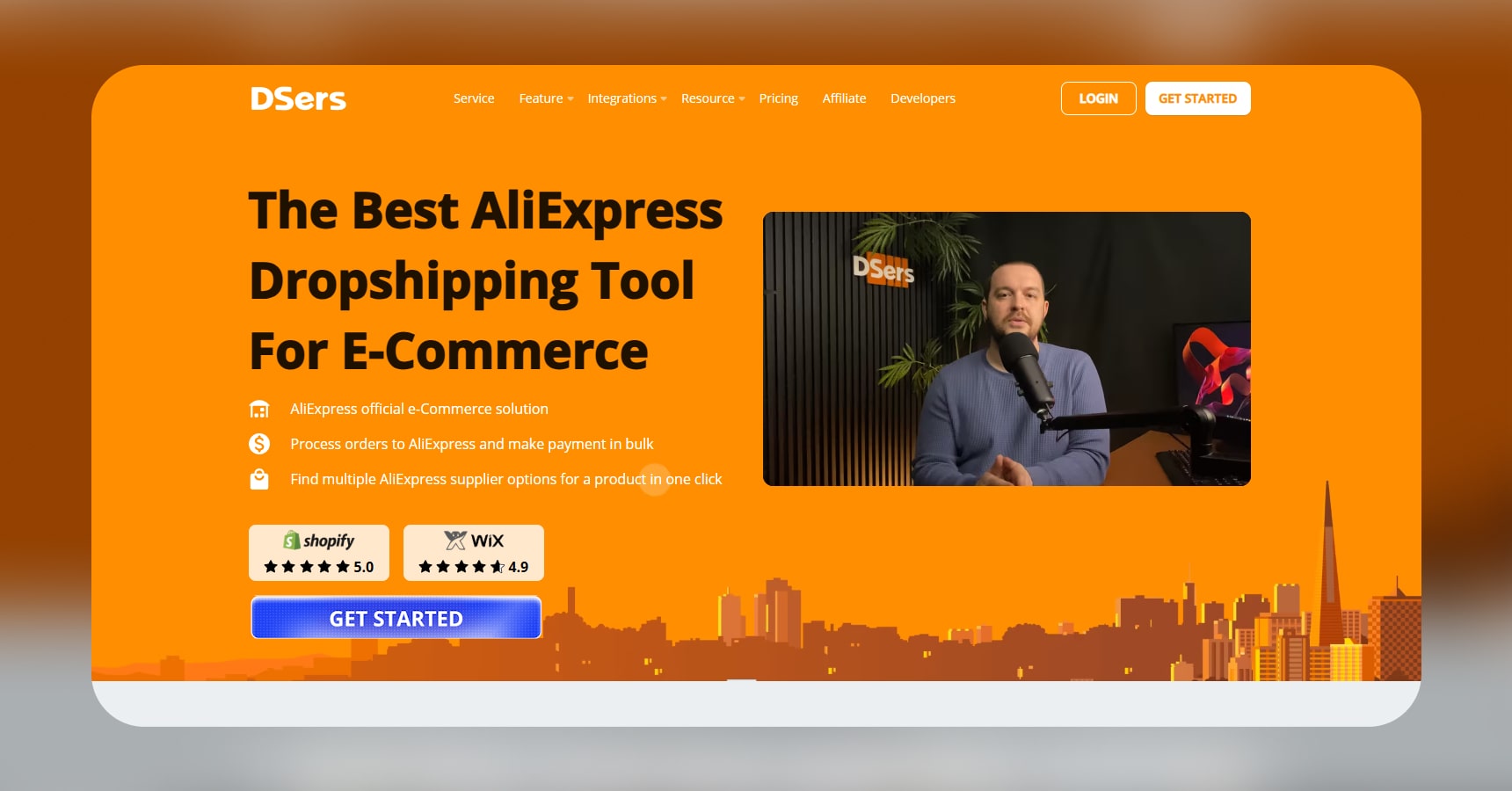
DSers is a platform that helps to source products from AliExpress. It’s focused on simplifying order management and supplier coordination. DSers allows placing bulk orders quickly, manage multiple suppliers, and keep everything organized in one place. While it doesn’t build a store, it integrates smoothly with Shopify and WooCommerce.
Key features:
- Bulk order placement to speed up your order fulfillment process
- Supplier management tools to avoid stockouts and ensure product availability
- Integration with popular ecommerce platforms like Shopify and WooCommerce
- Automatic syncing of prices and inventory to keep your store up to date
- Multiple supplier mapping to reduce risks and improve product reliability
💵 Pricing: Free plan available; advanced plans start at $19.9/month
❌ Cons:
- DSers packs in a lot of features, but its dashboard can feel cluttered and confusing for beginners
- Some users report slow responses from support, which can be frustrating when issues pop up
🎯 Best for: Sellers who want to offer local shipping.
SaleHoo – trusted directory for reliable suppliers and niche ideas
⭐️4.4 on G2
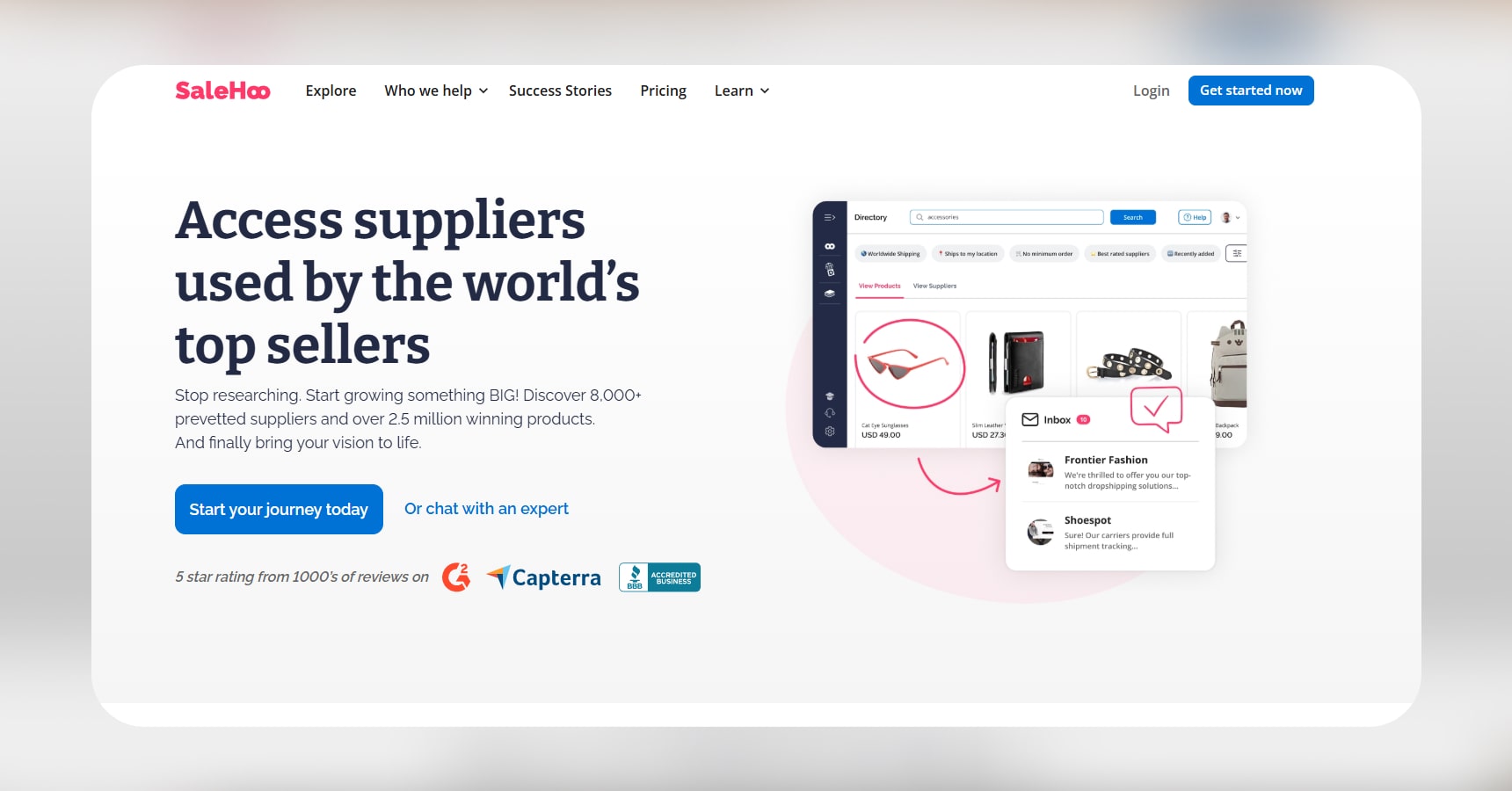
SaleHoo is a go-to directory for finding verified suppliers and researching product ideas. It’s great if you’re just starting out or want to avoid sketchy suppliers.
It’s not a store builder – it’s a tool to source smarter and sell better.
Key features:
- 8,000+ vetted suppliers for dropshipping and wholesale
- Smart product research tools to spot trending, low-competition items
- Step-by-step training and support for beginners
💵 Pricing: $108-588/year or $299-1699 for lifetime access
❌ Cons:
- SaleHoo doesn’t offer automatic syncing with your online store, so you’ll need to manually manage listings and orders
- SaleHoo requires a paid subscription even just to access supplier info, which might not suit beginners testing the waters
🎯 Best for: Beginners who need help finding solid suppliers and niche product ideas before launching their store.
Spocket – US and EU suppliers for quality and reliability
⭐4.3 on Shopify App Store
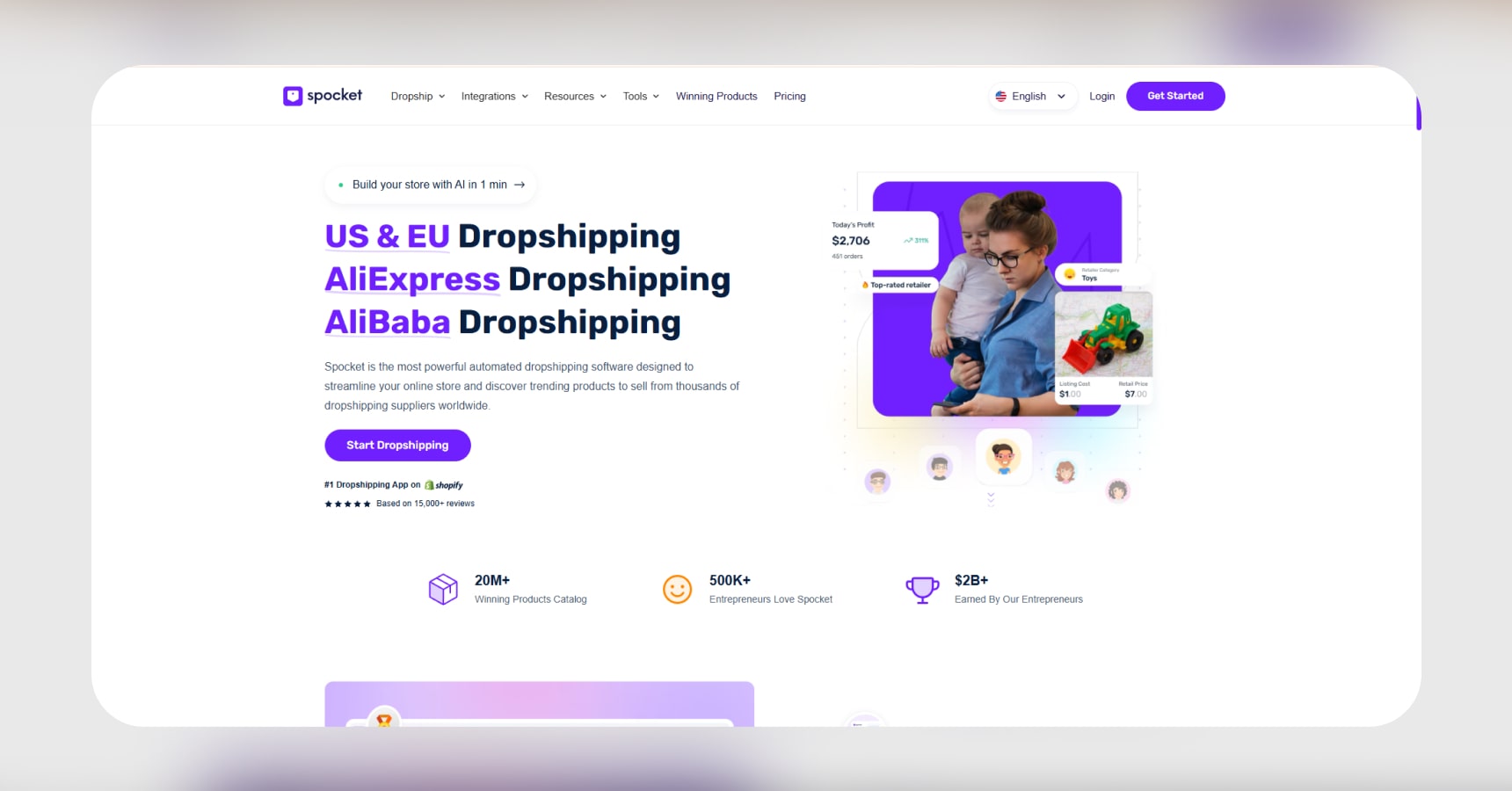
Spocket suits sellers who want to offer products sourced mainly from the US and Europe. This gives your customers better shipping times and reliable quality, which can boost brand’s reputation. Spocket also integrates easily with Shopify and WooCommerce, providing professional tools to build and grow stores.
Key features:
- Access to suppliers based in the US and Europe for faster delivery
- Branded invoicing and packaging to enhance customer experience
- Easy product import with real-time inventory updates
- Integration with Shopify and WooCommerce for smooth store management
- 24/7 customer support to help when needed
💵 Pricing: Free plan available; premium plans start at $39.99/month
❌ Cons:
- Spocket focuses mainly on US and EU suppliers, so options for other regions are pretty limited
- The free version offers very few products and features, so upgrading is almost a must
🎯 Best for: Sellers who who want to work with reliable US and EU suppliers, and focus on branded or boutique-style products.
Modalyst – premium and eco-friendly products
⭐4.0 on Shopify App Store
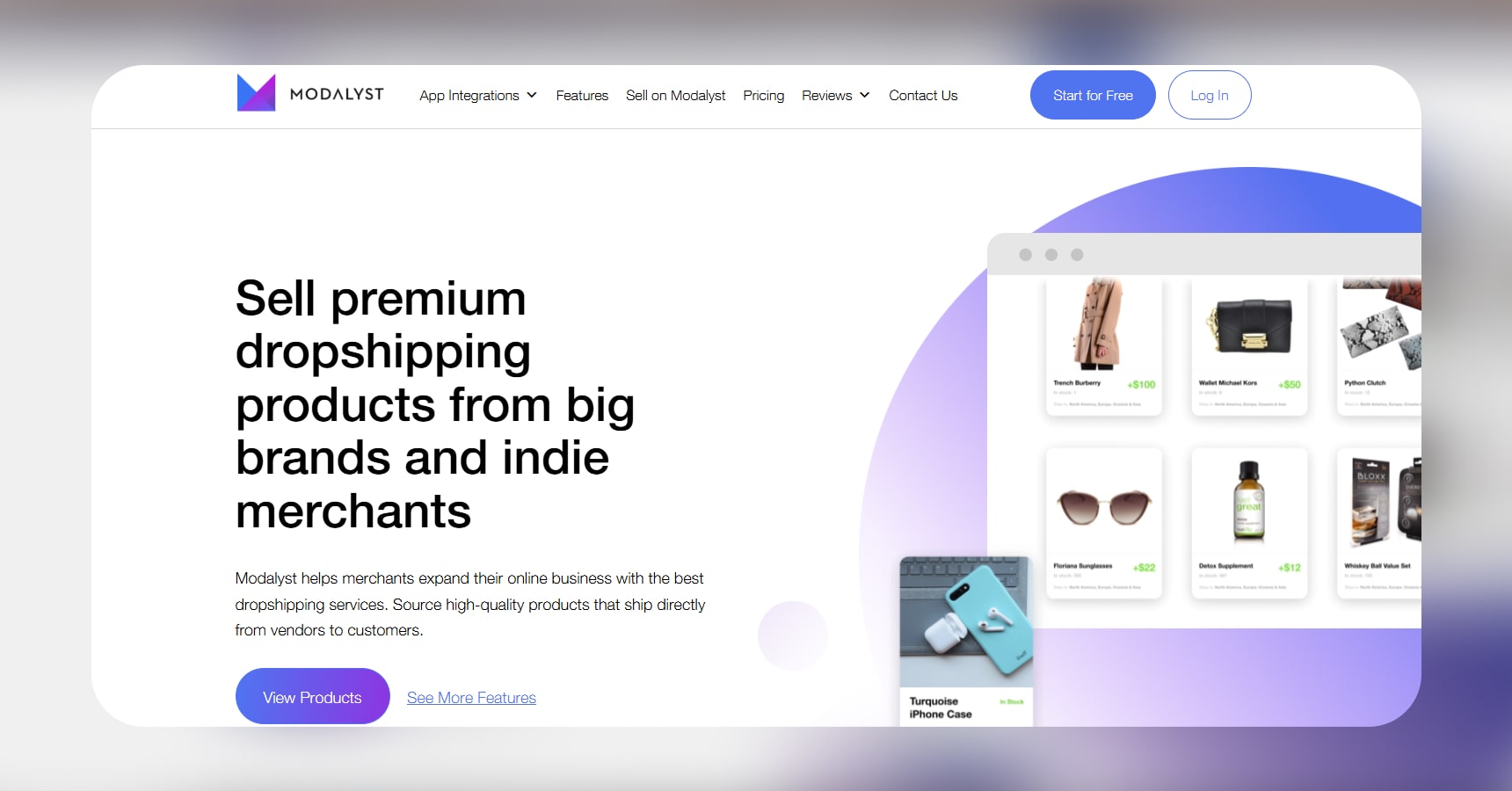
Modalyst is a go-to option if a store focuses on luxury, boutique, or eco-friendly products. They curate a network of vetted suppliers offering sustainable and unique items that help the brand stand out. Modalyst integrates seamlessly with platforms like Shopify and BigCommerce, making it easy to add premium products to catalog.
Key features:
- Access to luxury, eco-friendly, and unique product lines
- Automated syncing of inventory and pricing to keep your store accurate

- Dropshipping with suppliers who offer fast shipping options
- Tools for order tracking and customer communication
💵 Pricing: Free plan available (limited to 25 products); paid plans start at $35/month
❌ Cons:
- Some suppliers may charge shipping separately
- Shipping reliability and fees can vary by brand and location
- Can get pricey for premium features
🎯 Best for: Sellers targeting a higher-end market or looking to build a brand with unique, stylish products.
CJ Dropshipping – product sourcing with branding options
⭐4.0 on Capterra

CJ Dropshipping offers a huge product catalog and provides services like custom packaging, professional product photography, and branding support. They also have warehouses worldwide, helping serve customers globally.
Key features:
- Custom packaging and branding services to build brand identity
- Professional product photography to improve listings
- Warehouses around the world for efficient fulfillment
- Automated order processing and tracking for smooth operations
💵 Pricing: Free plan available; paid plans start at $15.99/month
❌ Cons:
- Interface can feel overwhelming at first
- The quality can be inconsistent across items
- Shipping times vary depending on location
🎯 Best for: Sellers who want end-to-end dropshipping, plus the ability to build a custom brand or try print-on-demand products.
Wholesale2B – huge product selection for multi-channel selling
⭐4.5 on Trustpilot
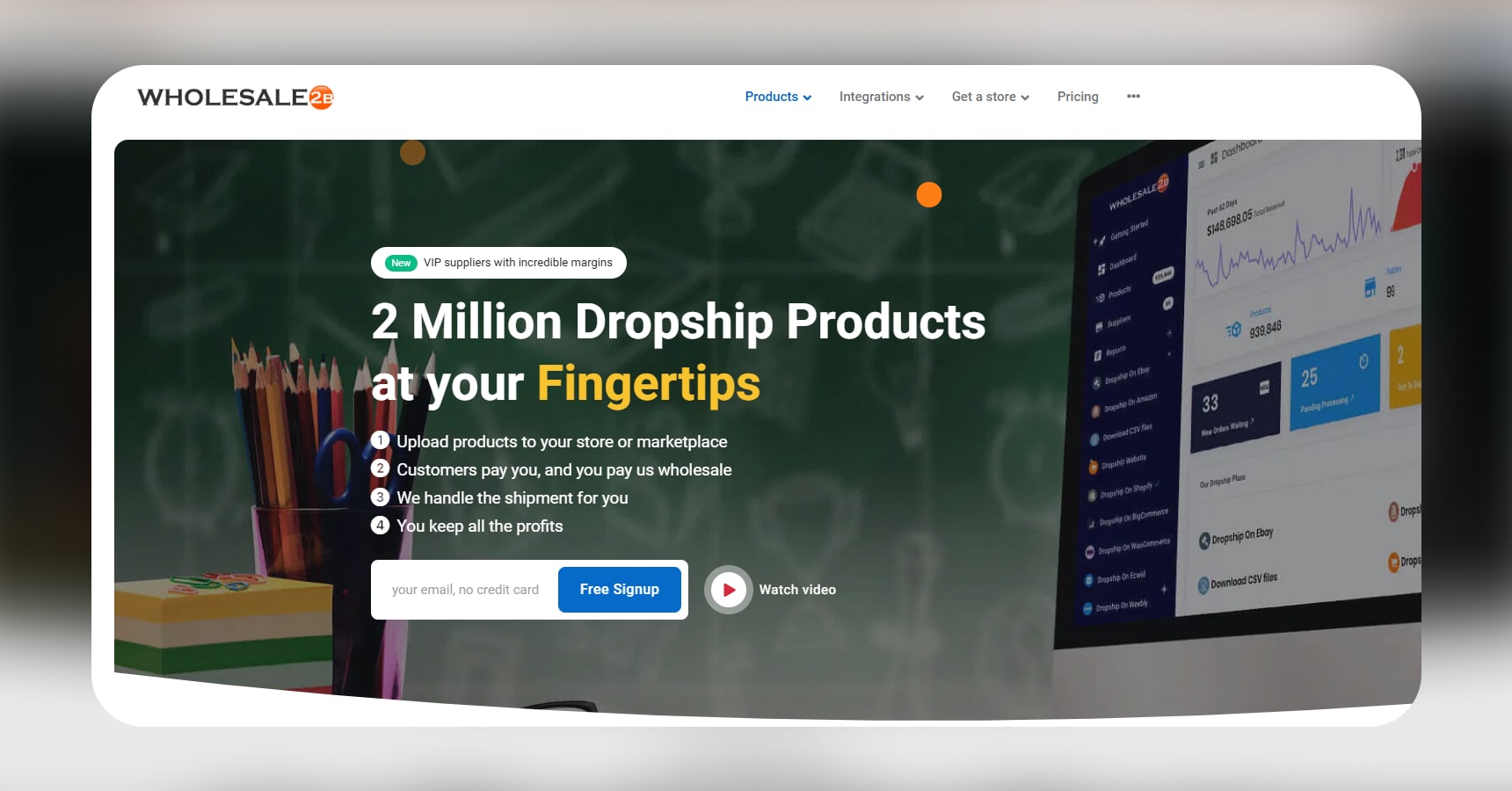
Wholesale2B is a strong option for sellers who want to sell on multiple platforms. It offers access to over a million products and integrates with Shopify, eBay, Amazon, and more. This lets manage all sales channels from one dashboard.
Key features:
- Centralized order and inventory management dashboard
- Automated product listing and syncing to save time
- Support for multi-channel selling to grow your business faster
💵 Pricing: $19.99-99.99/month
❌ Cons:
- Interface feels a bit outdated
- Some suppliers charge shipping and handling fees
🎯 Best for: Beginners and side hustlers who want a wide selection without managing multiple supplier accounts.
Inventory Source – full automation with real-time supplier sync
⭐2.3 on Trustpilot
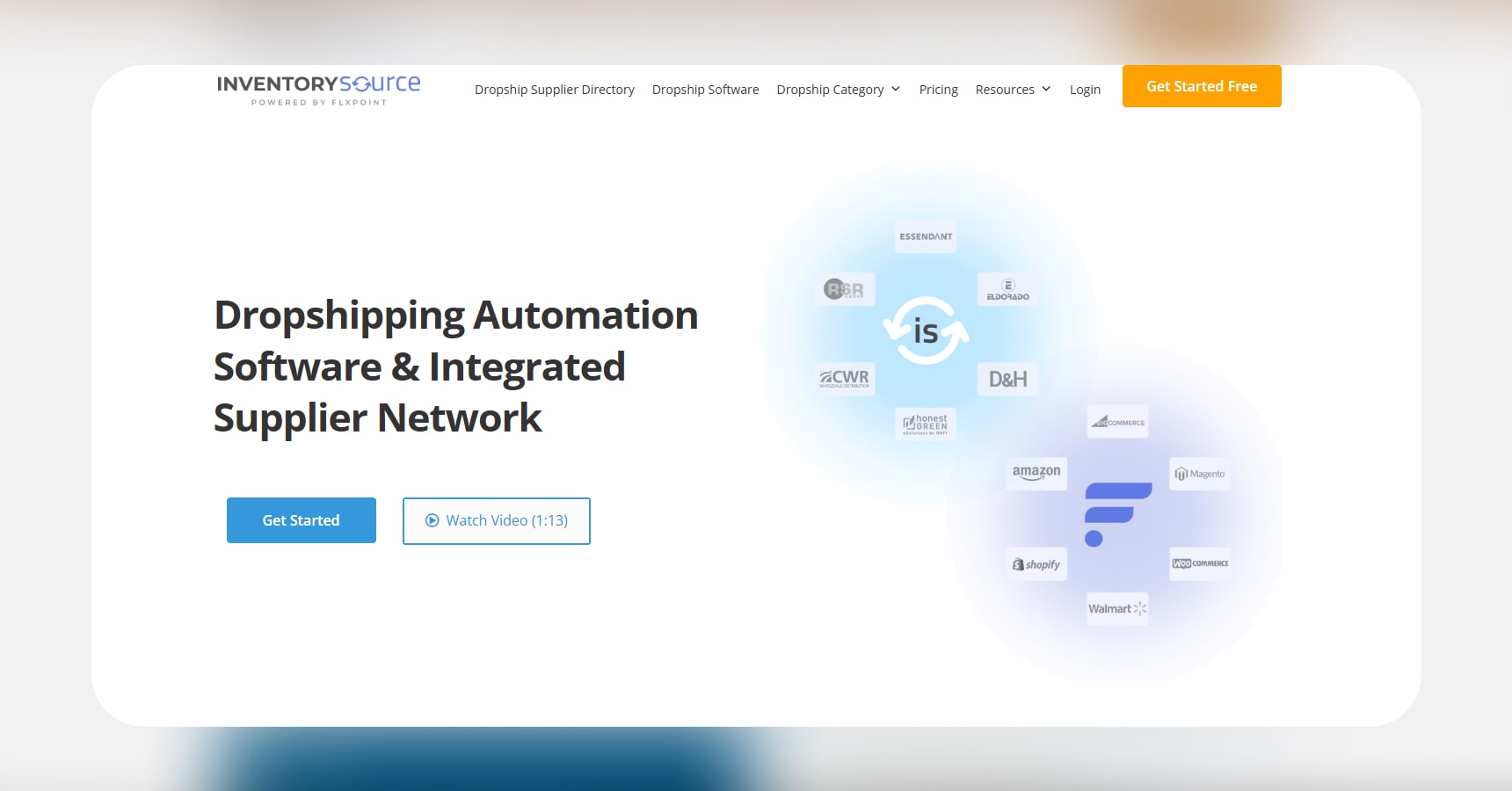
Inventory Source connects with over 230 verified suppliers and handles the heavy lifting by syncing product data, stock levels, and order routing automatically.
Key features:
- Access to a large directory of pre-integrated suppliers across niches
- Automatic inventory syncing and order routing
- Detailed product data uploads and custom product filtering
- Option to manage multiple suppliers from one dashboard
💵 Pricing: Free directory access; paid plans start at $299/month
❌ Cons:
- Higher monthly pricing for full automation
- Product sourcing quality depends on the chosen supplier
🎯 Best for: Dropshippers who want hands-off backend management and need to work with multiple suppliers across various platforms.
Helpful features to watch out for
Choosing the right platform can seriously affect how smooth (or stressful) your dropshipping journey is. While every seller’s needs are different, there are some essential features that make the best dropshipping websites stand out – and save you tons of time and money down the line.
- Automated order fulfillment: This is a must. Once a customer places an order, your platform should automatically handle processing, forwarding it to the supplier, and tracking it – so you’re not stuck clicking buttons all day.
- Inventory and price syncing: Products go out of stock and prices change. A good platform keeps your listings up to date in real time, preventing overselling or charging customers the wrong amount.

- SEO-optimized product pages: Look for platforms that offer clean, keyword-friendly descriptions, meta tags, and proper structure. This helps your store rank higher on Google and brings in free traffic over time.
- Built-in upsell and cross-sell tools: If your platform suggests related products or allows add-ons during checkout, you can increase the average order value without much extra effort. It’s like passive income stacking on top of every sale.
When evaluating platforms, make sure they support these features – or offer easy integrations that do. That way, you’re setting yourself up not just for basic sales, but for scalable, long-term success.
New trends shaping dropshipping
As the market grows and customer expectations evolve, smart sellers are leaning into these fresh trends to stay ahead of the curve 👇
Social commerce is driving sales
With TikTok Shop, Instagram Checkout, and live shopping trends, customers are discovering and buying products right on social media.
✅ Why it matters: You can test products fast and generate buzz without spending a fortune on ads.
🛠 Tip: Look for dropshipping platforms that offer social media integration or video content support.
Example:
Automated Promotion: expert ads from $10/day 🎯
No ad experience? No worries. Our team runs your campaigns – targeting, testing, and scaling – all done for you. Set your budget (from just $10/day) and let us handle the rest. Ideal for solopreneurs and busy sellers who want results fast without the guesswork.
Eco-conscious shopping is growing
More shoppers are choosing sustainable, ethically sourced products. Platforms that offer green alternatives or let you showcase eco-friendly items in your store are gaining popularity.
✅ Why it matters: Selling products that align with customer values can lead to repeat buyers and great word of mouth.
AI-powered tools are becoming essential
From AI-generated product descriptions to smart upselling tools, artificial intelligence is creeping into every part of ecommerce.
✅ Why it matters: AI helps save time, boost conversions, and improve the shopping experience – automatically.
Multi-supplier flexibility
Sellers want more control over their supply chain. Today’s platforms increasingly let you work with multiple suppliers at once, so you’re not stuck if one runs out or slows down.
✅ Why it matters: You reduce risk and get more product variety for your store.
Customer experience is front and center
Live chat, tracking pages, SMS updates – customers expect communication and clarity. The best platforms now offer tools to keep buyers informed and happy.
✅ Why it matters: Great service = great reviews = more trust and better sales.
Compliance and transparency are key
With stricter rules around data, taxes, and shipping policies, platforms that help you stay compliant are gaining trust fast.
✅ Why it matters: It protects your business and builds customer confidence.
Stay flexible and keep learning to stay ahead of the curve.
Wrapping it up
Choosing the best dropshipping website isn’t one-size-fits-all. You have to think about your niche, audience, and how much control you want. Some platforms help you get started fast. Others give you room to grow into a serious brand.
Try a few out, explore what works, and start small. Most of all – keep moving forward.
🚀 Ready to stop guessing and start growing? Let AliDropship help you kick things off the smart way.
Which site is best for dropshipping?
Can I make $10,000 per month dropshipping?
What is the most successful dropshipper?
Is $100 enough for dropshipping?
Which dropshipping is most profitable?









